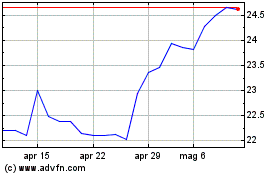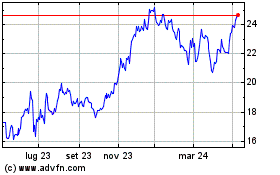Meatpacker JBS Removed At-Risk Workers from Plant Amid Covid-19 Surge -- Update
04 Dicembre 2020 - 4:29PM
Dow Jones News
By Jacob Bunge
Meatpacking company JBS USA Holdings Inc. said it has removed
hundreds of at-risk workers from a Colorado beef plant in response
to rising Covid-19 infections, as the U.S. meat industry seeks to
defend itself against the pandemic's current surge.
JBS's move comes as the largest U.S. beef processor faces a
fresh Covid-19 outbreak in Greeley, Colo., where the company
maintains a beef plant that employs about 3,500 people, making it
one of the country's largest.
U.S. meatpackers are shoring up defenses to keep Covid-19 out of
plants that collectively employ hundreds of thousands of workers,
supplying meat to fast-food chains and supermarkets. Rapidly
spreading infections associated with U.S. meatpacking plants last
spring killed dozens of workers, forced widespread shutdowns and
led to shortages in some meat products, while backing up livestock
on farms.
JBS's latest response appears to be one of the biggest
containment efforts a major meat-packing plant has made since the
spring and shows the challenges still facing the industry as the
virus spreads.
The company on Nov. 7 removed 202 Greeley plant workers
considered vulnerable to the coronavirus due to age and other
factors, a JBS spokesman said. Those workers are getting full pay
and benefits and can return to work after community-infection rates
decrease, he said. The step has had marginal effect on the plant's
beef production, according to the company.
The Colorado Department of Public Health and Environment has
reported 32 infections among workers at the plant, classifying it
as an outbreak on Nov. 17. The department separately has counted 46
positive cases among workers at JBS's corporate offices in another
outbreak dated to Oct. 19. Weld County, where the plant is located,
has reported an average of 235 positive cases over the past week,
according to county health-department data.
JBS and other meat companies, including Tyson Foods Inc.,
Cargill Inc. and Smithfield Foods Inc., responded to the pandemic
by installing automated temperature checks at plant entrances and
partitions between processing line-work stations, while requiring
masks and sitting workers farther apart in company cafeterias. Some
are testing employees randomly to guard against asymptomatic
workers unknowingly spreading the virus, and expanding paid sick
leave so infected employees aren't tempted to keep reporting to
work.
JBS, a unit of Brazilian meat company JBS SA, last spring
temporarily closed several beef and pork plants across the country
as Covid-19 infections spread among workers. Other big meat
producers, such as Tyson, Smithfield and Cargill, also closed
plants. At JBS's Greeley beef plant, six workers died last spring,
all over age 60. JBS in mid-March offered paid leave for all U.S.
plant employees aged 70 or older, and later expanded that to cover
workers who are 60 and older.
Across the company's U.S. plants, currently about 8% of workers
have been sent home with pay due to their higher-risk status. That
number has increased over the fall as Covid-19 cases generally have
climbed around the country, the spokesman said. JBS has spent about
$5 million on a "surveillance-testing" model that tests a random
sampling of workers with no symptoms at each plant, while
monitoring virus case rates at communities around its facilities,
he said.
That data has helped determine when and how many workers to
remove from plants, and helped make executives optimistic they can
avoid repeating last spring's shutdowns, JBS USA Chief Executive
Andre Nogueira said in October.
"I'm pretty confident we are not going to have the size of the
disruption we saw in April and May," Mr. Nogueira said.
Kim Cordova, head of the local United Food and Commercial
Workers International Union, which represents JBS plant employees,
said sending home at-risk workers was a good move. She added that
the company needs to offer daily on-site testing for employees to
ensure the virus doesn't take root again in the plant.
The JBS spokesman said the company worked with the state last
week to offer testing to the plant's entire workforce, and tests
workers at the plant daily if they show Covid-19 symptoms or
believe they have been exposed to the virus.
Meat-industry executives have sought priority for plant workers
to receive vaccines against the coronavirus as they become
available, after front-line health workers and particularly
vulnerable people. The Centers for Disease Control and Prevention's
advisory committee tasked with guiding the agency's recommendations
on vaccine prioritization has proposed food and agriculture workers
to receive the shots as part of "Phase 1b," after health-care
personnel and long-term care-facility residents.
Write to Jacob Bunge at jacob.bunge@wsj.com
(END) Dow Jones Newswires
December 04, 2020 10:14 ET (15:14 GMT)
Copyright (c) 2020 Dow Jones & Company, Inc.
Grafico Azioni JBS ON (BOV:JBSS3)
Storico
Da Mar 2024 a Apr 2024

Grafico Azioni JBS ON (BOV:JBSS3)
Storico
Da Apr 2023 a Apr 2024
